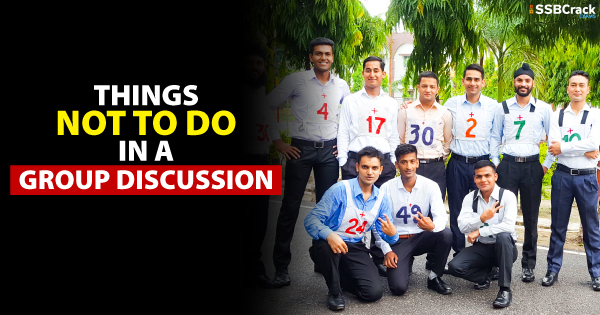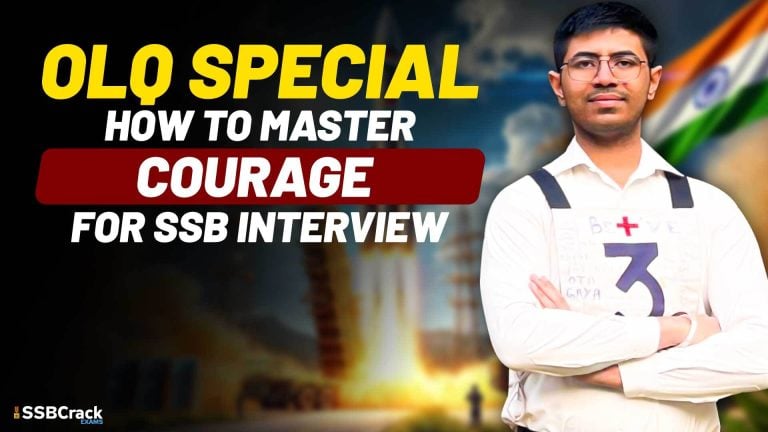We often find people discussing and talking about various social, economic and political matters. These discussions can be formal as well as informal. Informal discussions are the ones that take place with our friends in a restaurant, at a coffee shop, in canteens and other such places whereas a formal discussion takes place at an office, seminar halls, recruitment centres or other official venues.
A group discussion (GD) is a planned, structured and systematic interaction with a purpose behind it. The basic idea of a group discussion is to develop a better perspective on the main issue by incorporating the various viewpoints. The GD is used in the SSB (along with many other organizations) as a technique for personality assessment of the candidates for job selection. Generally, groups of six to eight members are made and they are given a topic to discuss within a limited time period (anywhere from 30 minutes to 45 minutes). The topic might be a case, an opinion or a problem. The assessors are looking for particular skills in the candidates through the GD process.
The assessors are looking for the following skills and qualities in each candidate:
- Subject knowledge
- Oral communication skills
- Listening skills
- Use of appropriate language
- Clarity of thought and expression
- Positive attitude
- Clear articulation
- Leadership skills
- Assertiveness
- Self-confidence
- Objectivity
- Patience
- Motivation
- Adaptability
- Persuasiveness
You might have seen or been a part of a GD in which it becomes extremely difficult to have a discussion without getting into an argument and starting a debate. It is extremely important that you try to exhibit each of the above-mentioned skill and quality to ace your GD. It’s a team activity where you as an individual are also being assessed. So you have to balance both the things. You need to emerge as the leader in your group and keep the GD on track. Yet, there are some things that you should never do in a GD, if you don’t want to kill your chances of succeeding in it.

- Initiating the GD for the sake of it.
The direction of a GD depends on who is initiating it. The content here is very important. Don’t ever start a GD without having much facts and knowledge about it. Although it is advised that you should take the opportunity to initiate a GD, but with lack of proper content the initiation can backfire on you. The starting point needs to be powerful and impactful, not generic and obvious. - Getting emotional.
In a GD, not everyone will hold the same view and opinion. Accept it. A group member might make a comment that might seem unacceptable to you or it might get your all excited and aggressive they will get benefited by it, not you. The mature way to handle such situations is to speak with facts and logic. Don’t lose your cool, be polite. - Making sweeping statements.
Sweeping statements are strong, one-sided opinions that lack factual support. These kinds of statements may sound good but an assertion is of no use unless you can back it up with facts and/or logical reasoning. Think through a point before speaking and support it with facts. - Over quoting the statistics.
While there are some people who simply under estimate the relevance of quoting the statistics in a GD, there are others who quote the facts and figures throughout the GD. Excess of anything is bad, same goes for the statistics. Over quoting the statistics weakens the impact of what you say. Don’t make it your assertion; make it a support to your assertion. - Using complex English.
While speaking in a GD, you have to make sure that everyone understands you, otherwise how will you make people believe in what you are saying? Use of too complex, long sentences and presenting your opinion in a complicated manner will make other lose interest in you. Speak in a simple manner. Conversely, the use of Hindi and other informal words should also be avoided. - Being over polite.
Keeping a non-fading smile on your face throughout the GD and nodding and shaking your head to whatever the other members are saying will get you nowhere. Too much of over politeness and smiling leads to suspicion. Also it gets irritating after a while! - Speaking fast.
Since the GD is time bound, it’s a common misbelief that speaking fast will buy you more time and you will be able to talk more and give more views. In fact, speaking fast leads you to lose track of what you are talking, your thoughts don’t remain connected. The slower you speak the better since in that way you make each word count. - Looking at the GTO.
The GD is taking place between you and your other group members. The GTO is not a part of that discussion. He is an observer. Looking at the GTO or looking at the ceiling won’t help you in any way. You are speaking with your group members so maintain a proper eye contact with them, no one else. Making eye contact with the GTO shows that you are seeking his approval. - Digressing from the topic.
A topic has been given to you and you are expected to complete your GD within a specified time period. As a good team member you need to make sure that the GD isn’t diverting to another parallel topic. It’s easy for such a situation to happen but it should be checked. Stick with the topic given to you and discuss accordingly. - Underestimating the power of your body language.
Along with what is being said, the assessor is looking at what is not being said. The way you sit, your posture, the way you make eye contact, everything nonverbal is being observed by the GTO. So pay heed to this aspect as this is the most avoided one. - Not speaking at all.
This is the blunder of blunders that one can do in a GD. It’s a group discussion and it is expected that each group member has to voice their opinion about the given topic. Not speaking at all will convey all the wrong things about to the GTO.
You can prepare for SSB Interview OIR Test Officer Intelligence Rating Test and PPDT Picture Perception and Description Test and other defence entrance exams such as NDA, AFCAT, INET, and CDS by taking Written Online courses as they will not only give you access to full-length quality lectures but will also provide the facility to take standardized mock tests for better study and strategic growth in the exam. You can take multiple quizzes after each lesson to ensure the full understanding of the subject along with creating your customized lesson plans. You can check out the course content along with other important specifics at SSBCrack exams.
You can also access them through the SSBCrack Exams app available in the google play store.
Jai Hind






















1 thought on “11 Things Not To Do In A Group Discussion”
U forgot mentioning ” speaking too much in GD and not giving others fair chance” this is what I did in my ssb